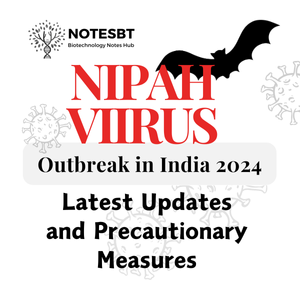Table of Contents
Monkeypox virus (MPXV) generally regarded as mpox. It has captured the attention of several countries due to its re-emergence. Reporters said; among 115 countries, Democratic Republic of Congo has been eliminated as potential increases in monkey pox cases.
Over 16,800 suspected cases were reported and more than 500 deaths. Stats reported, about 96% of fatalities globally during this period. It’s transmission to others countries involves UK, Africa and unfortunately Pakistan. As, cases has been reported in Pakistan, it will be crucial to control due to lack of health care infrastructure. However, WHO declare it as an emergency all around the Globe.
Fortunately, Health Authorities of India reported, there were no such cases reported. Therefore, the spread of mpox in different countries is because of travelers and the people in close contact with them. Moreover, WHO and Centre for disease control and prevention (CDC) warns that there is potential risk of evolving monkey pox endemic to become pandemic.
Previously, significant outbreak of Monkey Pox virus in 2022 was declared as “pandemic” and “Public Health Emergency of International Concern (PHEIC)” by WHO. Therefore, the increasing stats had raised concerns among the Health Authorities towards the development of vaccines. Awareness campaigns and following the SOPs are important to prevent Monkey pox virus spread.
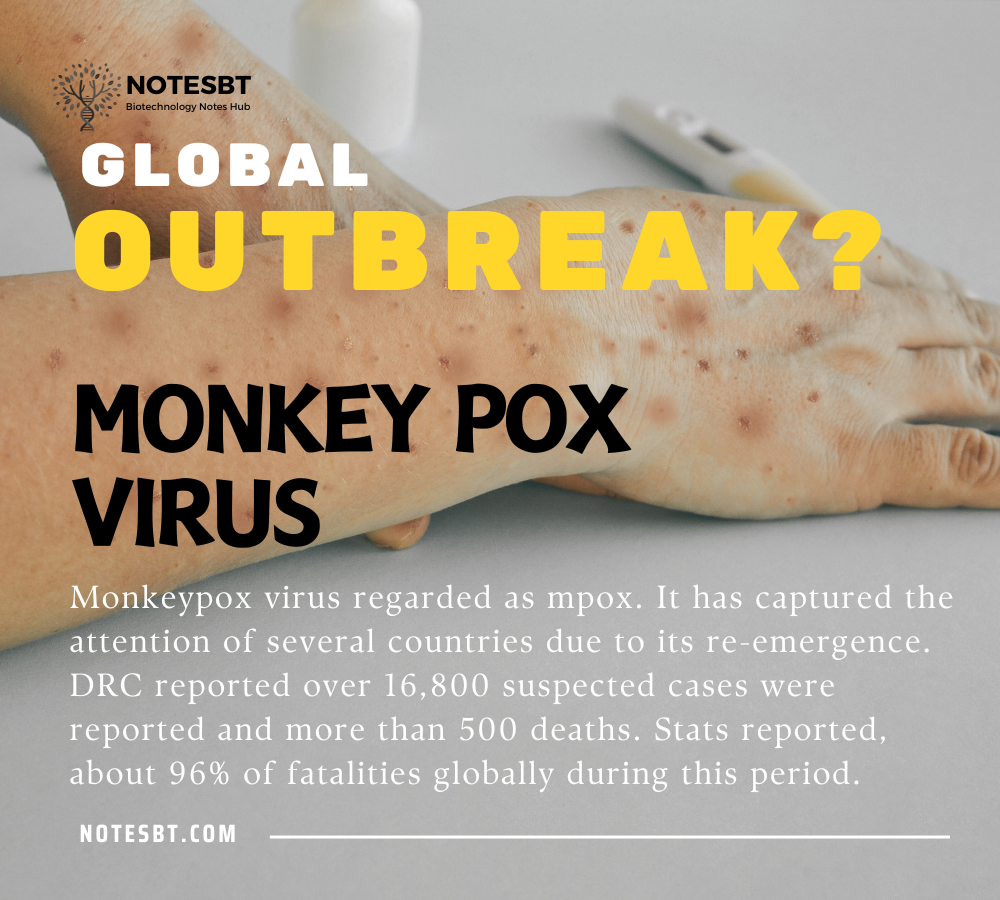
What is the Monkeypox Virus?
Monkey Pox Virus is a viral disease, having zoonotic origin (animal to human transmission). In 1958, it was first identified in monkeys during research carried out on their colonies. The first human case was reported in 1970 in DRC. Therefore, the virus was reported as endemic in parts of Central and West Africa but due to global spread it resulted into a pandemic.
Monkey Pox Virus is New Covid?
The recent outbreak of Monkey Pox has raised concerns regarding last pandemic i.e. Covid 19. The main question rises is; “Monkey pox virus is similar or New variant of Covid 19”?
WHO recently has cleared the chaotic perception that mpox and Covid 19 are two caused by two different viruses even a bit signs and symptoms are similar. Therefore, having zoonotic origin and similar family doesn’t meant to be similar virus.
Therefore, mpox virus and Covid 19 are not similar and mpox is not the new emergent of Covid 19.
Structure of mpox:
Mpox belongs to Ortho-poxvirus genus having much similar characteristics to small pox virus but there is difference in in severity and transmission. It is large and double stranded (ds) DNA virus having complex structure. It is 200-250 nm approximately in diameter, making it one the largest viruses that infect the humans. The genome size is about 197kb and encodes around 200 proteins i.e. are involved in evading the host immune response for replication.
The Monkey pox virus is enveloped, having outer lipid membrane derived from host cell during its replication. The core contains the viral DNA and the protein i.e. the replicative machinery. The electron microscope shows the virus comprised of brick-like or oval shape having a distinctive surface displaying fine filamentous threads.
Strains of Monkey Pox:
Monkey pox virus has two different clades shown on phylogenetic tree. The clade I is endemic and more severe in Central Africa where clade II is less severe and endemic to West Africa.
The mpox outbreak occurred in 2022-2023 was caused by the strain present in subclade IIb. It mostly impacts the bisexuals and the men who have sex with men.
The Dr Clare Looker, Chief Health Officer Reported to Health professionals and the Victorian community that;
“About 120 mpox cases have been reported since 21 August 2024. All the people were infected due to subclade strain IIb. The data are updated daily and is available at Notifiable conditions report”.
Therefore, world health organization has declared the monkey Pox virus outbreak in eastern and central Africa a Public Health Emergency of International concern i.e. emergent strain of clade Ib which is more severe.
Transmission and Spread
The primary way of spread is direct contact with bodily fluids, blood mucosal lesions of infected animals or cutaneous lesions. In addition to human-to-human transmission occur through contact with infected person lesions, respiratory droplets or in Contact with contaminated material like bedding.
The virus gets its entry into the host through mouth, eyes and nose, primarily the exposed or broken skin, the respiratory tract or mucous membranes.
Who is at Risk?
The people who are in direct contact in closed vicinity of infected person may immediately get infected. Moreover, the prolonged intimate contact with infected person may lead to severe conditions.
Symptoms of the Monkeypox Virus
As we all know that virus starts its replicative cycle after its entry into host. The incubation period for monkeypox virus usually lasts for 6 to 13 days and severe conditions may range from 5 to 21 days. The incubation period is divided into two; an invasive period and eruption period.
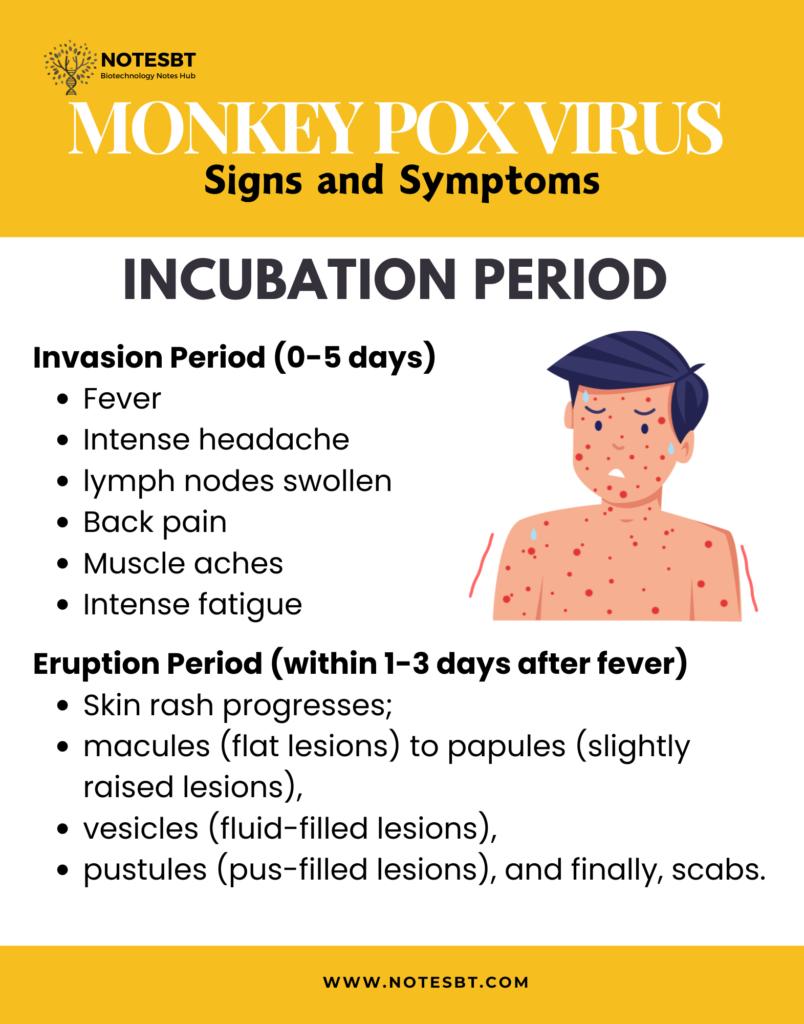
1. Invasion Period (0-5 days):
- Fever
- Intense headache
- Swelling of lymph nodes (lymphadenopathy)
- Back pain
- Muscle aches (myalgia)
- Intense fatigue (asthenia)
Therefore, the initials symptoms of Monkey pox were exactly similar to small pox or chicken pox. But later on, the swelling of lymph nodes is the significant characteristic feature of monkey pox infection.
2. Eruption Period (within 1-3 days after fever):
Skin rash, often begins on the face and then spreads to other parts of the body. Where the rash progresses from:
- macules (flat lesions) to papules (slightly raised lesions),
- vesicles (fluid-filled lesions),
- pustules (pus-filled lesions),
- and finally, scabs.
The rashes develop more on face, hands, and feet rather than the trunk. It also affects the mucous membranes of the genitals, mouth, and conjunctivae, and the cornea.
Diagnosis and Testing
Monkey pox virus can be tested through polymerase chain reaction (PCR) by taking samples from lesions of infected people. The serological testing also help to identify the past infections causes by viruses through antibody titar.
Are Small pox and Chicken Pox same as Monkeypox virus?
The viruses like small pox and chicken pox were closely related to mpox but both are different. Few characteristics were similar to monkeypox virus including symptoms and signs. Therefore, the key characteristics of similarities and their differences were listed below;
Monkeypox virus Vs Small Pox:
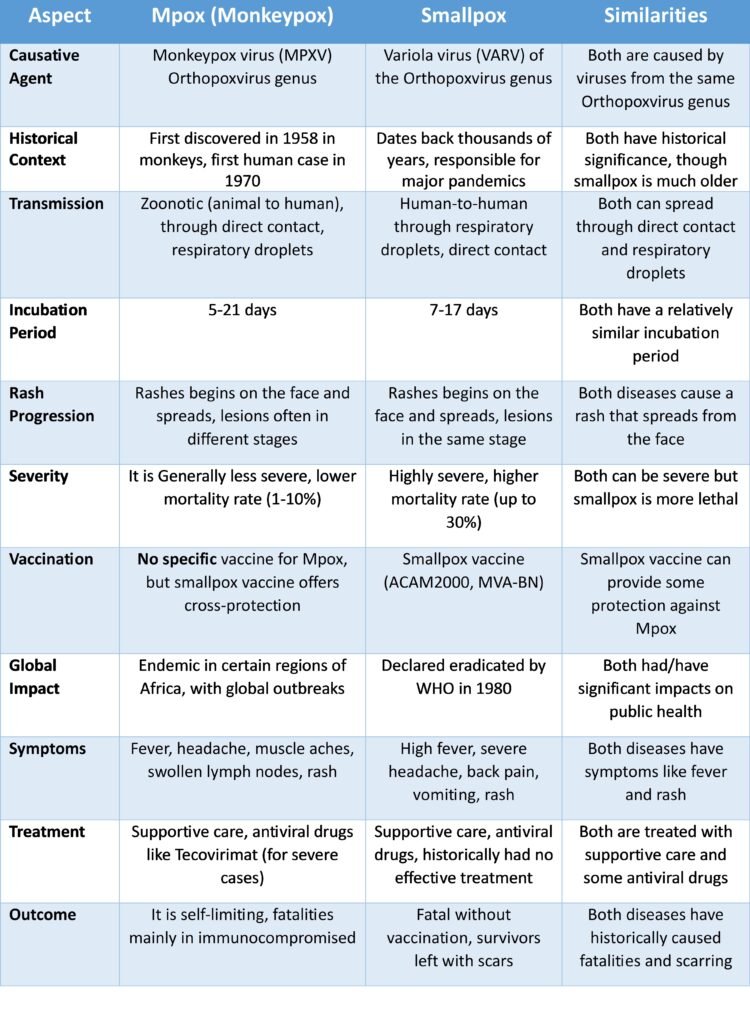
Monkeypox virus vs chicken pox
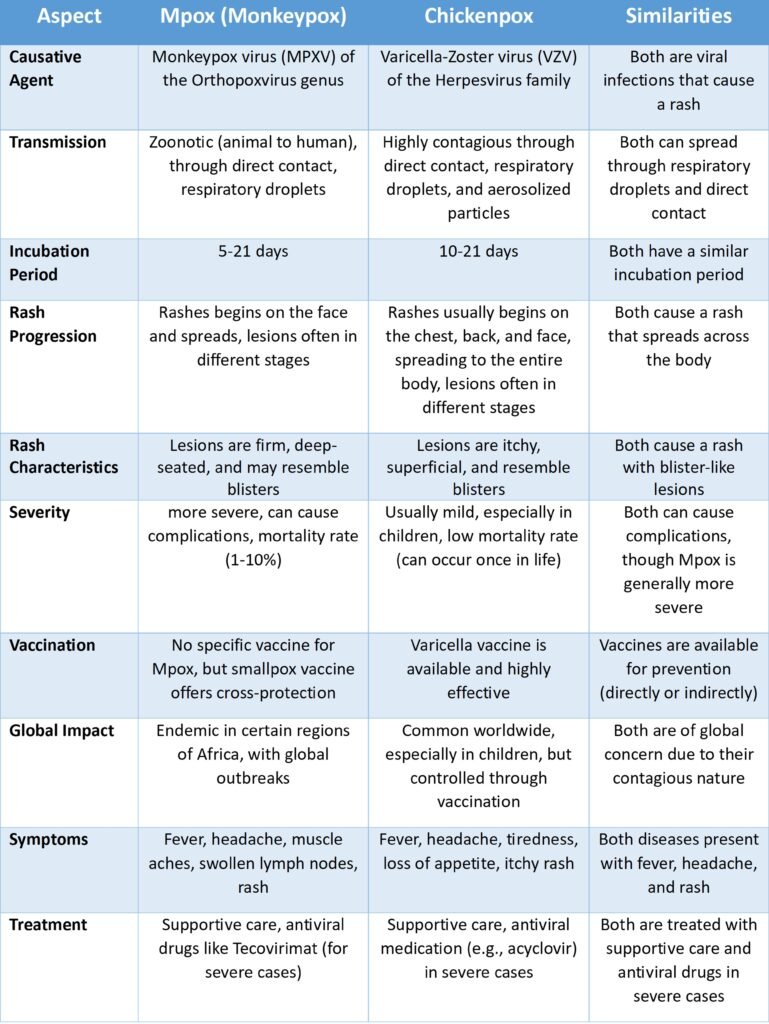
mpox and Pregnancy
The pregnant women are at high risk against monkey pox infection. Therefore, the infections due to viruses leads to complications such as stillbirth, miscarriage or monkey pox infection in newborns. It clearly means that monkey pox infection can be transmitted to the new born. However, it is advised that pregnant women should avoid contact with infected animals or humans or that particular area of infection. And if exposed than properly seek medical assistance.
Prevention and Vaccination
It was considered that the best way to prevent viral infections like mpox if vaccination. But the health Authorities has reported that the vaccinated people are still at risk of getting infection but primarily at a bit lesser concern. It means it is wrong to say that vaccinated people will not get infected.
Moreover, WHO states that the vaccine used against small pox is effective against mpox based on virus genetic similarities. In response to previous outbreaks, the scientists are trying to develop an effective and efficient vaccine against mpox to prevent the viral replication.
Vaccination is crucial to prevent the spread of monkey pox virus. Therefore, the vaccines used for small pox could also be efficient against mpox to prevent the viral replication. But the vaccines could not completely immune the person to get virus, certainly to lesser extent. Moreover, recent outbreaks due to strain of clade Ib is deadly, mortality rate is increasing.
How to Prevent Monkeypox virus?
- Avoid Contact with Infected Individuals
- Practice Good Hygiene
- Use Personal Protective Equipment (PPE) while dealing with patients
- Get Vaccinated, those recommended by WHO
- Practice Safe Sexual Behaviors
- Avoid Contact with Wild Animals
What to Do? If You Contract Monkeypox:
If you have contracted monkeypox, then it is important to take immediate steps to prevent spreading of virus and seek medical assistance:
- Isolate Yourself:
- Seek Medical Assistance
- Stay Hydrated and take a lot of Rest
- Inform Close Contacts to prevent the spread
- Follow Public Health Guidance
Conclusion
Monkeypox virus is re-emerging with different strains and lasting its impact worldwide. Therefore, it is less severe than smallpox and chicken pox. It has potential to cause widespread outbreaks globally. The only way to prevent viral infection is to follow health care guidelines. Moreover, research is required for the development of vaccine for prevention and to control the global outbreak.
Monkeypox Virus FAQs
- What are monkeypox symptoms?
Fever, headache, muscle aches, swollen lymph nodes, rash
- How is monkeypox caused?
Caused by Monkeypox virus (MPXV) of the Orthopoxvirus genus
- Who is at risk for monkey pox?
Immunocompromised people, new born babies pregnant women and the people in contact with infected persons.
- How is monkeypox treated?
By antiviral treatment and seeking medical assistance monkey pox are treated
- How is monkey pox transmitted?
Zoonotic (animal to human), through direct contact, respiratory droplets
- Does monkeypox go away?
Yes, by seeking proper medical assistance and treating mpox they go away.
- Why is it called mpox?
In 1958, it was first identified in monkeys during research carried out on their colonies, i.e. called as monkey pox.

